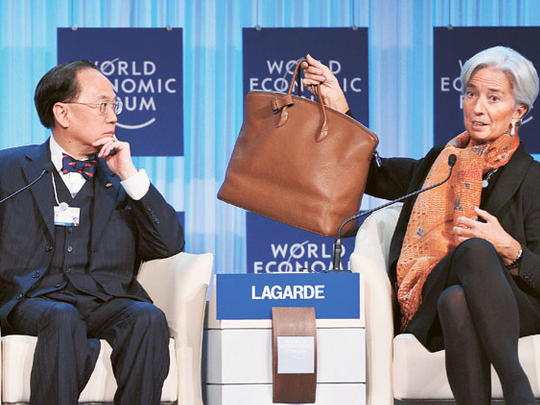
Davos: Global finance chiefs warned no economy is safe from Europe's debt crisis, adding urgency to their calls for its governments to deliver a swift resolution.
Policymakers from Hong Kong to Canada used the last full day of the World Economic Forum to push euro region counterparts to boost their bailout cashpile to protect Italy and Spain. They also pressed Greece and its creditors to strike a credible agreement to cut the nation's debt.
Optimism tempered
Failure to deliver home-grown solutions would cost Europe any chance of further outside support and undermine the International Monetary Fund's push for more crisis-fighting resources of its own, officials said. The concern tempered optimism from earlier in the week when delegates expressed hope that Europe had succeeded in calming markets after two years of turmoil.
"I've never been as scared as I am about the world," Donald Tsang, Hong Kong's chief executive, said yesterday in Davos, Switzerland. "Nobody's immune. You need decisive action. You need to inspire confidence."
Bank of Canada Governor Mark Carney estimated the European crisis will subtract 1 percentage point from global growth by the end of 2012 "and that's in a world where this crisis is contained." Europe's pain could be transmitted via trade or financial channels with banks already hoarding cash or investing only in domestic markets, he said.
Yale University Professor Robert Shiller echoed the concern by estimating the euro area will contact this year by more than the 0.5 per cent predicted by the IMF. Nouriel Roubini, co-founder of Roubini Global Economics, said Greece may be forced to quit the single currency within 12 months.
"The Eurozone is a slow-motion train wreck," Roubini said.
The concern leaves the euro area's leaders under pressure to raise the size of their rescue funds from the limit of €500 billion (Dh2.4 trillion) set to take effect in July when a permanent fund comes online aside the temporary European Financial Stability Facility.
While they plan to reassess that amount in March, UK Chancellor of the Exchequer George Osborne indicated they may need to do so sooner by demanding steps in "the next few weeks". EU leaders next meet in two days time in Brussels to draw up a fiscal compact to strengthen governance of the euro area.
Osborne also sided with the consensus by urging a fast accord on slashing Greece's debts, three months since creditors agreed to implement a 50 per cent cut in the face value of more than €200 billion of debt.












